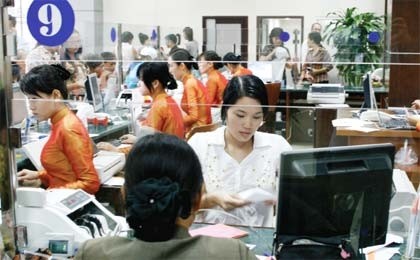Rumours scotched as banks pass stress test
“An initial stress test for Vietnam’s banking system has been done, proving that a domestic banking crisis is unlikely,” said Le Xuan Nghia, National Financial Supervision Committee’s (NFSC) vice chairman.
 |
| Local banks’ foundations are built on rock and not sand |
Nghia told FPT Securities clients at a workshop on “New Monetary Policy Impacts on the Economy and Equities Market” in Hanoi that some foreign institutions had warned a banking crisis or major balance of payment volatility was possible, resulting in a currency shock.
Normally a monetary crisis would follow a banking crisis, he said, adding that currency traders and speculators usually targeted economies with huge trade imbalances of over 12 per cent of its gross domestic product (GDP), a fixed foreign exchange rate and developed derivatives market.
Nghia said for Vietnam, the country was applying a flexible exchange rate, not a fixed mechanism. “Therefore, forex risks have been removed.” In the year to date, the State Bank has twice weakened the US dollar-Vietnamese dong rate, compared to sizable adjustments in 2009.
“The risk of short-term foreign debt is also low, while forex market chaos risks are unlikely,” he said, adding that the country’s short-term foreign debt was around $3-4 billion.
Nghia, however, did not reveal how and which criteria were used for the stress test, saying that Vietnamese banks were quickly growing up thanks to the stock market’s development.
“Many banks’ chartered capital has been quickly expanded, from just VND70 billion to around VND3,000 billion in just a few years via the stock market, said Nghia.
Meanwhile, the State Bank on May 20 issued Circular 13/TT-NHNN on safety ratios for credit institutions, requesting that all banks raise minimum capital adequacy ratios (CAR) to 9 per cent by October 1, 2010. Nghia said the new CAR was better than many global banks as 9 per cent ratio was all equity capital.
“The only risk is that the dong might be subject to money speculators as the US dollar interest rates are [too] high, attracting foreign investors to make “carry trades” in Vietnam,” Nghia warned.
Around $2 billion in carry trade has poured into Vietnam this year and this sum has not flown out as the US dollar rates in Vietnam remain highly attractive, according to NFSC statistics.
Currency carry trade is a strategy in which an investor sells a certain currency with a relatively low interest rate and uses the funds to purchase a different currency yielding a higher interest rate. A trader using this strategy attempts to capture the difference between the rates, which can often be substantial, depending on the amount of leverage used.
What the stars mean:
★ Poor ★ ★ Promising ★★★ Good ★★★★ Very good ★★★★★ Exceptional
 Tag:
Tag:
Related Contents
Latest News
More News
- Cashless payments hit 28 times GDP in 2025 (February 04, 2026 | 18:09)
- SSIAM and DBJ launch Japan Vietnam Capital Fund (February 04, 2026 | 15:57)
- Banks target stronger profits, credit growth in 2026 (February 04, 2026 | 15:43)
- Vietnam on path to investment-grade rating (February 03, 2026 | 13:07)
- Consumer finance sector posts sharp profit growth (February 03, 2026 | 13:05)
- Insurance market building the next chapter of protection (February 02, 2026 | 11:16)
- NAB Innovation Centre underscores Vietnam’s appeal for tech investment (January 30, 2026 | 11:16)
- Vietnam strengthens public debt management with World Bank and IMF (January 30, 2026 | 11:00)
- Corporate bond market poised for stronger growth cycle (January 28, 2026 | 17:13)
- Vietnam's IPO market on recovery trajectory (January 28, 2026 | 17:04)



















 Mobile Version
Mobile Version